Cairo Diary: New Year's Day
Saturday 1st January 2011
Today was nice and lazy. After an early lunch (2.30pm) with Ahmad and his friend Chris, we met up with Mohammad and his girlfriend for coffee. Afterwards I returned to the house and fell asleep for a couple of hours, before a large crowd of us converged at Mamdouh’s flat to eat leftovers from his New Year party.
Having been in Cairo for almost a week, and today having been fairly quiet, perhaps now is a good time to pause for reflection on life here in this city of extremes.
Culture: Cairenes are wonderfully friendly people, whether rich or poor. At no point during the visit so far have I felt threatened walking the streets, even when in poverty-stricken suburbs – indeed, it feels safer than, say, Newcastle, or some parts of Durham. Hospitality is clearly a central part of life here – for example, I have only managed to pay for two meals so far, and even those were despite strong protests (and not your standard English false modesty). Everyone wants you to have a good time: after greeting you with “hello”, many locals will say “welcome”, as if it is a great honour that you are in their country.
Despite being home to an estimated twenty million inhabitants, Cairo is an exceptionally small place if you know the right people. Seif appears to know half the population. There are endless parties to attend.
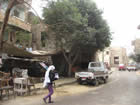 A typical street scene in Old Cairo
A typical street scene in Old Cairo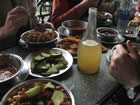 Kosherie – a hearty meal for folk on a budget
Kosherie – a hearty meal for folk on a budget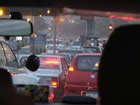 Traffic in Cairo
Traffic in Cairo
Food: Meal times are still taking some getting-used-to, and my metabolism is still acclimatising to the long gap between breakfast (mid-morning) and lunch (late afternoon to early evening). Dinner (perhaps “supper” is a better word) is late evening, sometimes even at midnight. One certainly never leaves before midnight. But the food is well worth the wait. African and Middle Eastern delicacies abound and servings are always generous. Anything that can be stuffed is stuffed.
Infrastructure: Everything is ramshackle, dilapidated and dirty. The former of these is due to lack of any form of civic planning, so buildings pop up wherever land can be purchased, and very little care is taken over design and snagging (with a few notable exceptions). Buildings in the suburbs are un-rendered. Dilapidation occurs because most rented apartments are still subject to rent control, leaving landlords with a paltry EL 2 (20p) per month rent in some cases, giving them neither the motivation nor the finances to maintain buildings effectively. As a result, what were once beautiful housing districts with grandiose French or Belgian architecture are now devalued and populated by the lower classes.
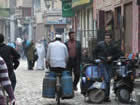 The gas man came to call... on his bicycle
The gas man came to call... on his bicycle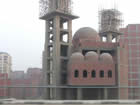 A new mosque being built
A new mosque being built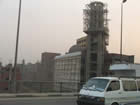 The same mosque being built, this time showing the rather ornate façade on the front
The same mosque being built, this time showing the rather ornate façade on the front
The dirt is a real problem. Sand storms and pollution cause a thick haze to descend upon the city which clogs the lungs and covers everything with a fine silt. Houses have to be cleaned daily to avoid the dust becoming problematic, but labour is cheap so most people have domestic help to combat the problem. I was told by one expat Brit that the pollution in Cairo is equivalent to twenty cigarettes a day.
Street furniture is placed arbitrarily, and often with no consideration for drivers or pedestrians. Kiosks often consume the entire width of the pavement, forcing pedestrians into the road. Indeed, it is often more efficient to walk in the road, as moving obstacles afford more flexibility than stationary ones.
Transport: The automobile is king in Cairo, and the only sensible way to travel. Service busses do rattle along the street but are decrepit, crowded and erratic (not to mention that it is difficult to discern the destination) – one particularly common design of bus features maintenance panels on the side which flap about as it is moving, causing adjacent traffic an additional hazard to watch for. Walking is possible, but as already intimated, difficult. The Metro system is cheap (EL 1) and viable, but only for a limited selection of destinations. There are trams in Heliopolis, but that is no good for the rest of town. Which leaves the car.
Due to the lack of any sort of urban planning, the streets in Cairo clog easily, and rarely is it possible to achieve speeds of twenty or thirty miles per hour. It is a jungle, in which only the fittest survive. Jeremy Clarkson once said, “the whole point of driving is to get ahead of the car in front”. He has clearly been to Cairo. Drivers have little appreciation of lanes, traffic lights, junctions or any other road rules. Whoever gets their nose into a space, wins. Cars will suddenly cut you up, without any warning or discernable reason, and you either jam on the brakes or do the same to the adjacent car (and so on, until the edge of the road). Junctions require the same tactic. Horns are deployed almost constantly, as well as indiscriminate flashing of the headlights for no obvious purpose. Headlights – and even sidelights – seem to be an optional extra at night (though adornments, such as blue LEDs and even flashing lights, seem almost compulsory). But it does work, even if there are the occasional scrapes and bumps.
Crossing the road can be quite a challenge, unless (like me) you are used to crossing Sherburn Road End in Gilesgate on a daily basis. The tactic is similar: if a car looks to be going slowly enough to stop before it hits you, step out in front of it, even if any further lanes are impassable. One local told me that the best tactic is to close one’s eyes, pray to Allah, and step out into the road.
During the day, news reached us that terrorists exploded a bomb outside a Coptic church in Alexandria last night, killing dozens and injuring still more. Perhaps plans to celebrate Christmas with the Copts on Friday will have to be reconsidered.
Previous:
Cairo Diary: St Antony and the Grumpy Monk
Friday 31st December 2010
Next:
Cairo Diary: Anglicanism, Art and Another Party
Sunday 2nd January 2011
